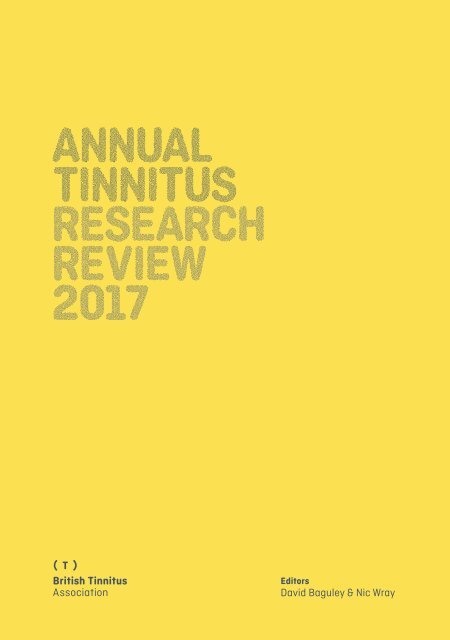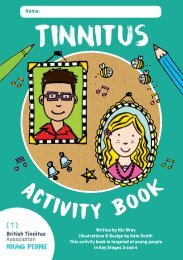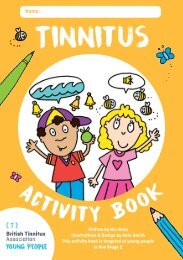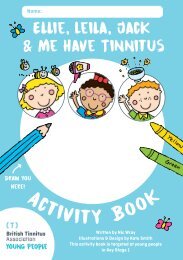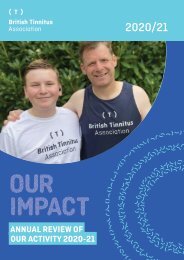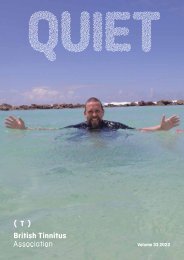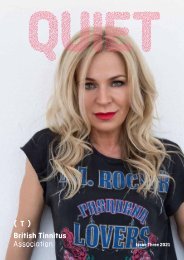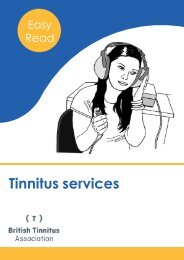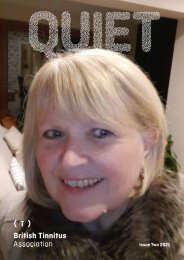Remember to enjoy the journey
Create successful ePaper yourself
Turn your PDF publications into a flip-book with our unique Google optimized e-Paper software.
ANNUAL<br />
TINNITUS<br />
RESEARCH<br />
REVIEW<br />
2017<br />
Edi<strong>to</strong>rs<br />
David Baguley & Nic Wray
Annual Tinnitus Research Review 2017.<br />
Copyright © British Tinnitus Association 2017.<br />
Edi<strong>to</strong>rs: David Baguley & Nic Wray<br />
The edi<strong>to</strong>rs would like <strong>to</strong> thank all <strong>the</strong> contribu<strong>to</strong>rs for <strong>the</strong>ir<br />
support and enthusiasm. We would also like <strong>to</strong> thank <strong>the</strong> copyright<br />
owners of <strong>the</strong> images and figures reproduced in this publication for<br />
<strong>the</strong>ir permission <strong>to</strong> reproduce <strong>the</strong>m ei<strong>the</strong>r directly or via licence.<br />
We believe that all such work has been acknowledged, but please<br />
contact Nic Wray on nic@tinnitus.org.uk if any have been<br />
inadvertently omitted.<br />
British Tinnitus Association<br />
Unit 5 Acorn Business Park<br />
Woodseats Close<br />
Sheffield<br />
S8 0TB<br />
www.tinnitus.org.uk<br />
info@tinnitus.org.uk<br />
0114 250 9933<br />
Registered charity no. 1011145 Company limited by guarantee no.<br />
2709302, registered in England.
T<br />
British Tinnitus Association<br />
DR SUSANNE NEMHOLT<br />
ROSING<br />
Master of Arts in Speech<br />
Pathology<br />
University of Copenhagen<br />
Susanne Nemholt Rosing has a<br />
Master of Arts in Speech Pathology<br />
and Audiology from <strong>the</strong> University<br />
of Copenhagen in 2003. She had<br />
almost 10 years of clinical practice<br />
working in <strong>the</strong> field of rehabilitative<br />
audiology and especially in tinnitus<br />
and hyperacusis management before<br />
she started her own research.<br />
Susanne completed her PhD<br />
<strong>the</strong>sis “Tinnitus and Hyperacusis<br />
Among Children and Adolescents in<br />
Denmark” in November 2016 at <strong>the</strong><br />
University of Sou<strong>the</strong>rn Denmark.<br />
In June 2017, Susanne started a postdoc<strong>to</strong>ral<br />
project on interventions for<br />
childhood tinnitus and hyperacusis<br />
and <strong>the</strong> development of specialist<br />
paediatric tinnitus and hyperacusis<br />
services in Denmark.<br />
NIC WRAY<br />
Communications Manager<br />
British Tinnitus Association<br />
<strong>Remember</strong> <strong>to</strong> <strong>enjoy</strong><br />
<strong>the</strong> <strong>journey</strong>:<br />
Dr Susanne Nemholt<br />
Rosing talks <strong>to</strong> Nic Wray<br />
What made you first interested in tinnitus?<br />
After I finished my Master of Arts in Speech Pathology<br />
and Audiology at <strong>the</strong> University of Copenhagen in<br />
2003, I started working in <strong>the</strong> field of rehabilitative<br />
audiology and especially in tinnitus and hyperacusis<br />
management. For me, <strong>the</strong> interaction and <strong>the</strong><br />
importance of paying close attention <strong>to</strong> each person’s<br />
s<strong>to</strong>ry and beliefs fascinated me, and <strong>to</strong> be part of <strong>the</strong><br />
process where each individual found a way back <strong>to</strong><br />
<strong>the</strong>ir life with tinnitus was very inspiring.<br />
How did your research career develop <strong>to</strong> where it is<br />
now?<br />
Since 2010, I have lectured in audiological education<br />
in Denmark at all levels from care givers <strong>to</strong> university<br />
degree students, where I also have been a supervisor<br />
for audiological students. My research career started<br />
because I was left wondering. Sometimes children<br />
and young people were referred <strong>to</strong> me because of<br />
<strong>the</strong>ir tinnitus or hyperacusis and I wasn’t sure how <strong>to</strong><br />
address <strong>the</strong>se children. This was <strong>the</strong> foundation for my<br />
PhD project “Tinnitus and Hyperacusis Among Danish<br />
Children and Adolescents”, where I was so lucky that<br />
David Baguley agreed <strong>to</strong> be part of my supervisor<br />
team and helped me in many ways both academically<br />
and personally. Although I had almost 10 years of<br />
clinical practice before I entered <strong>the</strong> academic world, I<br />
still consider myself as a novice.<br />
What research are you currently involved in?<br />
In June, I’m starting my postdoc project, which (if<br />
we can get funding) will focus on interventions for<br />
childhood tinnitus and/or hyperacusis. Currently, we<br />
have no national established tinnitus clinic for this<br />
population group in Denmark. A study of referral<br />
patterns and interventions that I conducted during<br />
my PhD indicated a general uncertainty about which<br />
services provide acquire sufficient interventions due<br />
<strong>to</strong> <strong>the</strong> structure of <strong>the</strong> Danish health care system, and<br />
children were identified and referred by chance. The<br />
intervention study will focus on developing a special<br />
service with critical mass for those children with<br />
tinnitus and/or hyperacusis <strong>to</strong> an extent that requires<br />
intervention.<br />
What aspect of your work personally gives you <strong>the</strong><br />
48<br />
Annual Tinnitus Research Review 2017
<strong>Remember</strong> <strong>to</strong> <strong>enjoy</strong> <strong>the</strong> <strong>journey</strong> T British Tinnitus Association<br />
greatest satisfaction?<br />
When I’m able <strong>to</strong> help connecting people with<br />
tinnitus with <strong>the</strong>mselves. After university, I became an<br />
examined body psycho<strong>the</strong>rapist. Body psycho<strong>the</strong>rapy<br />
is based on <strong>the</strong> concept that people experience <strong>the</strong><br />
world not only through <strong>the</strong>ir thoughts and emotions<br />
but also simultaneously through <strong>the</strong>ir bodies. Working<br />
with this holistic approach <strong>to</strong> treatment <strong>to</strong> address<br />
concerns of mind and body as one along with my<br />
audiological foundation is very satisfying.<br />
How has your clinical experience influenced your<br />
research?<br />
In many ways. I would never had started with research<br />
if I hadn’t met children and <strong>the</strong>ir families struggling<br />
with tinnitus. And I would never have had <strong>the</strong> nerve<br />
<strong>to</strong> start doing research at <strong>the</strong> age of 42 years old, if I<br />
didn't have <strong>the</strong> sufficient clinical ballast.<br />
What research <strong>to</strong>pic or question currently excites<br />
you?<br />
The pathology behind tinnitus is an interesting <strong>to</strong>pic.<br />
Are <strong>the</strong>re really structural abnormalities in <strong>the</strong> hearing<br />
system in children with tinnitus? Is it related <strong>to</strong> haircells,<br />
<strong>the</strong> audi<strong>to</strong>ry nerve or something else? Is it<br />
really an aspect of audi<strong>to</strong>ry neuropathy that we see<br />
in children or is it possible that <strong>the</strong> phenomenon of<br />
audi<strong>to</strong>ry neuropathy is related <strong>to</strong> <strong>the</strong> animal research<br />
only and not <strong>to</strong> human research per se. Also <strong>the</strong> risk of<br />
noise-induced tinnitus and hearing loss in adolescents<br />
due <strong>to</strong> hours of listening <strong>to</strong> high levels of music is<br />
an important research <strong>to</strong>pic. What is <strong>the</strong> most useful<br />
advice we can give young people, and how do we<br />
address it for <strong>the</strong>m in a meaningful way?<br />
What is your favourite piece of clinical research that<br />
has been done by o<strong>the</strong>rs?<br />
I’m very fond of <strong>the</strong> study by Formby and colleagues<br />
[1] in which <strong>the</strong>y evaluated predictions that followed<br />
directly from <strong>the</strong>oretical assumptions about <strong>the</strong> role<br />
of <strong>the</strong> gain mechanism in <strong>the</strong> control of hyperacusis<br />
and its treatment. They found that subjects who used<br />
earplugs showed increased judged loudness for<br />
sounds, whereas subjects who listened <strong>to</strong> a low-level<br />
wideband noise showed decreased judged loudness,<br />
which were consistent with <strong>the</strong> predictions outlined.<br />
This study is easy <strong>to</strong> explain and understand, and I<br />
often refer <strong>to</strong> it in clinical practice.<br />
What do you think is <strong>the</strong> biggest challenge facing<br />
tinnitus research at <strong>the</strong> moment?<br />
To design research studies that both provide<br />
knowledge that can make us move forward in tinnitus<br />
research and can be useful in clinical practice. Also<br />
<strong>to</strong> demonstrate if intervention works or especially if<br />
it is possible <strong>to</strong> show which part of an intervention is<br />
more successful. There are so many opportunities for<br />
interventions out <strong>the</strong>re, but <strong>the</strong> evidence is limited.<br />
What are <strong>the</strong> challenges of translating current<br />
research in<strong>to</strong> clinical practice?<br />
Time and awareness. Each time you expand your<br />
clinical practice, you need <strong>to</strong> add new procedures,<br />
new habits and you have <strong>to</strong> experiment in exactly how<br />
you can translate <strong>the</strong> research in<strong>to</strong> your practice.<br />
What aspect of research gives you <strong>the</strong> most hope for<br />
future treatments for tinnitus?<br />
A better understanding of how <strong>the</strong> brain works will also<br />
give something <strong>to</strong> <strong>the</strong> treatment of tinnitus. It could be<br />
related <strong>to</strong> better understanding of audi<strong>to</strong>ry neuropathy<br />
in humans. Is it related <strong>to</strong> noise exposure and can it<br />
also explain tinnitus in normal hearing individuals?<br />
Is <strong>the</strong>re any advice you would give <strong>to</strong> o<strong>the</strong>rs<br />
considering a research path in tinnitus alongside (or<br />
from) a clinical career?<br />
Don't be afraid <strong>to</strong> ask for help and guidance, and be<br />
kind and helpful <strong>to</strong> o<strong>the</strong>rs. Embrace both <strong>the</strong> clinician<br />
and <strong>the</strong> researcher inside you and remember <strong>to</strong> have<br />
patience with yourself. It is a process <strong>to</strong> develop a<br />
research path in tinnitus alongside a clinical career, but<br />
both working with people with tinnitus is so giving, so<br />
remember also <strong>to</strong> <strong>enjoy</strong> <strong>the</strong> <strong>journey</strong>.<br />
Thank you Susanne. It sounds as though you<br />
yourself have had a very <strong>enjoy</strong>able <strong>journey</strong> in<strong>to</strong> <strong>the</strong><br />
research field.<br />
[1] Formby C, Sherlock LP and Gold SL. Adaptive plasticity of loudness<br />
induced by chronic attenuation and enhancement of acoustic<br />
background. The Journal of <strong>the</strong> Acoustical Society of America, 2003.<br />
114: 55-58<br />
Annual Tinnitus Research Review 2017 49


